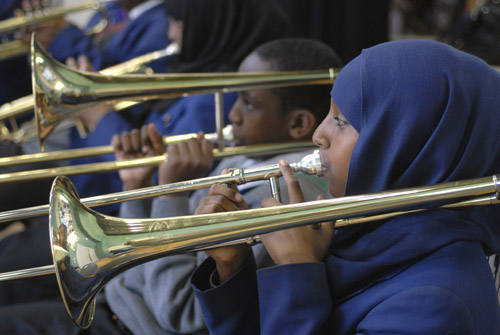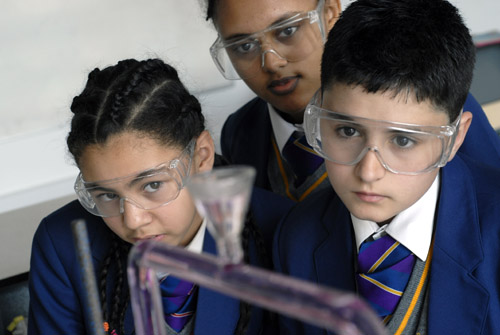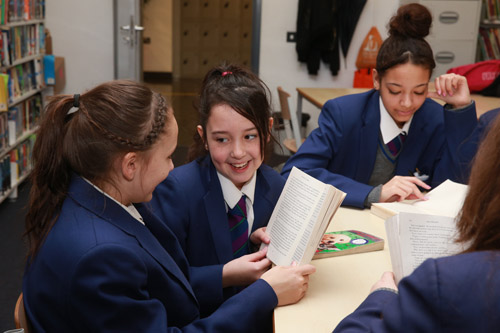We have high expectations for all our pupils and ensure that every learner is challenged and supported to reach their full potential.
History Curriculum
A high quality history education will help pupils gain a coherent knowledge and understanding of Britain’s past and that of the wider world. It will inspire pupils’ curiosity to know more about the past. This will equip pupils to ask perceptive questions, think critically, weigh evidence, sift arguments, and develop perspective and judgement. History helps pupils to understand the complexity of people’s lives, the process of change, the diversity of societies and relationships between different groups, as well as their own identity and the challenges of their time.
Key Stage 3 History
Pupils in Years 7, 8 and 9 study historical events, people and changes which complement the texts they study in English lessons. In this way pupils gain a deep contextual understanding of their English texts, as well as the historical periods of time underpinning these works.
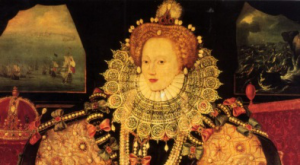
Elizabethan England
Pupils begin their studies with an introduction to the Tudor period (1485 -1603) focusing on the reign of Queen Elizabeth I. This includes understanding how the lives of the rich and poor were different within Elizabethan society to enhance their study of William Shakespeare’s play Much Ado About Nothing.
Pupils gain an understanding of the social and technological changes making up the Industrial Revolution between 1750 and 1900. They explore how these changes impacted on ordinary people living at the time. Pupils are able to distinguish the difference in the lives of the rich and poor, and the impact these influences had on their ideas and values.
Victorian crime, policing and types of punishment is studied to build the foundations for pupils’ study of GCSE History. Pupils learn about life in the dirty and crime-ridden city of London, and why a system of policing developed. As well as this, they consider why punishments have developed from being painful or resulting in death to a emphasis on rehabilitation.


Exploration and Empire
Pupils gain a deeper knowledge of the wider world and are exposed to a broader thematic history in this study of Empire and Exploration. This unit focuses on the role of the British Empire in the past, including Britain’s role in India, sea exploration, and Polar exploration in the 20th Century. These topics link to theme of travel writing in the English curriculum.
Warfare Through Time
Pupils critically analyse warfare over a 2000-year period of time. This thematic study helps pupils to understand change and continuity. Pupils begin by learning about the role of warfare in the Roman Empire and medieval worlds, and end by comparing them to the changing warfare of the 20th Century. The focus here is mostly the First and Second World Wars. This complements the study of War Poetry in English lessons.
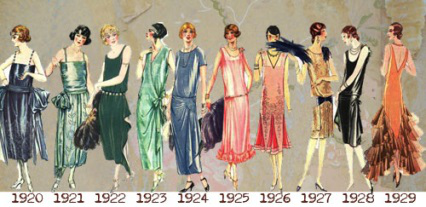
Elizabethan England
Pupils build on their Year 7 studies by having a closer look at aspects of Elizabethan society and government such as Elizabethan entertainment, sea exploration, and the battle with Spain during the Spanish Armada. This study pairs well with the reading of Shakespeare’s Romeo and Juliet in English lessons.

The Industrial Revolution
Pupils learn about the changes created by urbanisation during the Victorian period and study London as focus on the life of the Victorian poor. The impact of a poor diet, lack of sanitation, disease and increasing crime led to high mortality rates. Pupils also explore why improvements occurred to the lives of the poor which enabled the government to lead on social improvements.
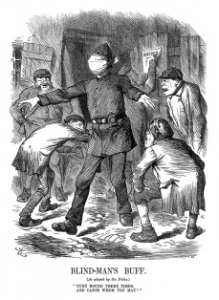
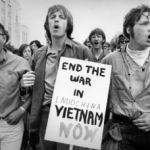
Warfare Through Time
This Unit builds on pupils’ study of warfare undertaken in Year 7. Pupils explore how technological advances have changed the experience of war in the modern world. In particular there is a focus on the Vietnam War (1964-72) and pupils will take an analytical approach to exploring case studies on wars in the recent past

Black Americans
This Unit allows pupils to have an understanding of the development of black Civil Rights over time. We explore how the lives of black English and American people have changed over time, beginning with life in Africa before slavery. This continues with an understanding of the transatlantic slave trade, and ends with looking at the growth of a Civil Rights Movement led by Martin Luther King and influenced by Malcolm X. This movement ultimately led to the Civil Rights Act in America in the 1960s. A topic that is explored in greated depth for GCSE History.
Depression in 1930s America
This topic explores the changing fortunes of Americans in the 1920s and 30s. Starting with an understanding of life during the economic prosperity of ‘the Boom’ years, pupils explore why the Wall Street Crash (1929) devastated the economy and led to a worldwide Depression. The experience of a society living in poverty with no government help is the focus of the book “Of Mice And Men”.
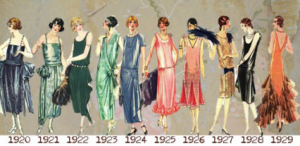
Pupils study History as a discrete subject with greater emphasis on key historical skills including the evaluation of sources and interpretations needed at GCSE level.
The First World War
Pupils weigh up the significance of the various causes of the First World War (1914-1918). The Unit focuses on the experience of ordinary soldiers during the war, technological advances and key battles which shaped the nature of warfare. Pupils also investigate the contribution made by soldiers from the British Empire as well as the experience of ordinary families back on Britain’s Home Front.

Pupils begin to develop their historical writing skills through practicing evaluative two-sided answers and building in justified judgements to their written work. Pupils strengthen the way they write about sources by increasing use of supported judgements.
The Holocaust
In this Unit pupils take a detailed look at one of the most notorious genocides in history. Their studies begin by introducing students to the life of Jewish people across Europe. We then focus on the discrimination faced by the Jewish population within Germany as the Nazi Party consolidated their control over the citizens of the country. Factors such as the Treaty of Versailles and Nazi propaganda are explored as reasons for the growth of anti-Semitic attitudes.

The Unit allows pupils to take an empathetic look at the lives of those facing growing discrimination as a result of the Nuremberg Laws, movement to the ghettoes, and the decision of the Final Solution which resulted in the death of six million people across Europe. Pupils use contextual knowledge to engage in sources and learn the skill of interpreting bias and reliability of evidence. By this stage, pupils will have been exposed to a range historical skills and exam questions needed at GCSE level.
Key Stage 4 History
The History GCSE course begins in the last term of Year 9 and follows the Eduqas (WJEC) course.
The Humanities department helps pupils to develop a number of key skills such as the ability to debate, analyse, evaluate and create judgements based on evidence. This is done using the following key objectives:
- Pupils develop their historical knowledge and understanding and their ability to explain, analyse and evaluate key events, people and changes in each unit of study.
- Pupils develop skills in researching, writing about, discussing and debating different views and interpretations of the main events and people involved in each unit.
- Pupils learn to investigate issues critically using a wide range of historical sources.
The Elizabethan Age, 1558-1603
The first unit studied is a depth study of the Elizabethan Age. The study of this unit begins in the summer term of Year 9 and is accompanied by a trip to Hampton Court Palace to allow pupils to develop their knowledge further.
This unit focuses on key topics and themes during the reign of Queen Elizabeth I. Key themes include: her personality; accession to the throne; government; people’s lives (e.g. rich and poor; entertainment and the theatre); Elizabeth’s religious problems (Catholics and Puritans); and relations with foreign powers (e.g. the Spanish Armada).
Crime and Punishment (c.500—the present)
The second unit studied is a thematic breadth study of Crime and Punishment from C. 500 AD to modern day. The study of this unit begins in the winter term of Year 10 and is accompanied by a trip to both London Dungeons to thematically asses crime and punishment over time, as well as to the East End to analyse the impact that crimes such as Jack the Ripper’s murders had on the people who lived in that area at the time.
This unit will study the development of crime, policing and punishment over time. The focus is to analyse changes and trends as well as to offer reasons for these changes. Key time periods include the Medieval, Early Modern and Industrial periods as well as the modern day. Key ideas include the Jack the Ripper murders of 1888, medieval methods of policing, industrial methods of punishment and changes to policing since 1900.
Germany in transition, 1919-1947
By the end of Year 10 pupils will begin to study Germany between the years 1919-1947 which encompasses key problems after World War One and focuses on the rise of Hitler and the Nazis.
This unit focuses on problems faced by the Weimar Republic after World War One due to the Treaty of Versailles and their inability to enact democracy in Germany. Additionally pupils will look at factors that led to the rise of the Nazi regime and the impact of the Nazi election to power. Finally pupils will analyse the change on groups within German society including women, Jewish people and children, before studying the effect of World War Two on the Nazi regime.
The Development of the USA, 1929–2000
The final unit that pupils will study in Year 11 will be focused on changes in the USA in the 20th century and will enable pupils to explain impacts of key events and people during this time period.
This unit focuses on key trends or turning-points in three main areas: political and social life (e.g. popular and youth culture; women’s roles); racial inequality and the struggle for equality by Martin Luther King and others; foreign policy – the Cold War (e.g. President Kennedy and the Cuban missile crisis; Vietnam) and the search for world peace.

